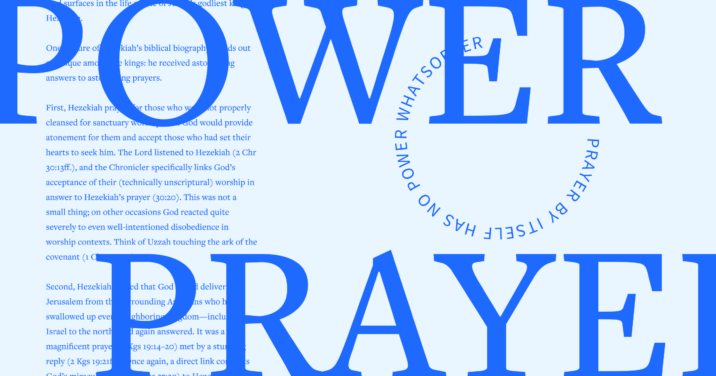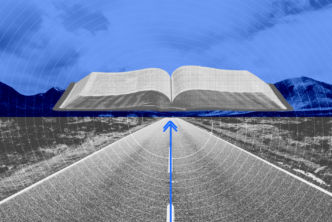Prayer by itself has no power whatsoever. It wields no inherent supernatural sway; nor does it involve a formula or ritual which, if “done right,” guarantees any desired result. Christian prayer is not magic. As the Dictionary of Biblical Imagery says,
Biblical prayer must be set in contrast with many other schemes for influencing deity common in the ancient Near East. Biblical faith excludes any attempt to use magic or formula to control or placate God.1
Prayer is not a spiritual power, but a means of communicating and conversing with an All-Powerful Person. Prayer is “powerful”—that is, meaningful and effective—only when and because it accesses a relationship with the one true God. The power is not in the prayer per se; it is in the Person with whom the Christian engages in prayer (1 Chr 29:12; 2 Chr 16:9). Prayer is “simple asking in a conversational manner.”2 The measure of prayer’s power, then, is the omnipotence of God himself, circumscribed only by his character, wisdom, and will.
A Christian view of the power of prayer must be grounded in the patterns and the teachings of God’s Word.
Asa’s prayer in overwhelming circumstances
Asa, for example, offers a model prayer for extreme circumstances in 2 Chronicles 14.
Asa’s situation was humanly impossible: the chronicler informs us of Asa’s comparative military unreadiness (2 Chr 14:8–9) in order to heighten our appreciation for the hopeless difficulty confronting Asa. We pray most effectually not when we are needy (which is always), but when we are conscious that we are needy.
We pray most effectually not when we are needy (which is always), but when we are conscious that we are needy.
Asa’s prayer offers an inspired pattern for our praying:
1. Affirm the omnipotence of God
“Lord, there is no one besides You to help between the powerful and those who have no strength.”3
Our relative strength or helplessness is inconsequential to God when we lean entirely on his intervention. Without that intervention, the strongest can fail. With it, the weakest can prevail.
2. Acknowledge sole dependence on God
“So help us, O Lord our God, for we trust in You.”
This word “trust” is the same Hebrew word (sha’an) translated “rely” in 13:18 and 16:7, 8—a very picturesque expression for resting one’s weight by leaning on something (like Saul leaning on his spear, 2 Sam 1:6).
3. Claim, humbly but confidently, your covenant relationship to God
“In Your name we have come against this multitude. O Lord, You are our God.”
Our confidence rests not only in God’s omnipotence but in his willingness to employ his power on our behalf—because of the covenant relationship that he initiates with us through Jesus Christ.
4. Direct your primary concern to the glory of God, not merely your personal deliverance or benefit
“Let not man prevail against You.”
Linking our prayers sincerely to the vindication of God’s name and reputation is not manipulating God. Rather, it is adjusting our perspective to what is really at stake and what really matters, regardless of what happens to us. The outcome of this supplication places the power of such prayer on display (14:12–13).
A sad and sober warning comes in 2 Chronicles 16, however, when Asa fails to rely on God in what appeared to him to be manageable circumstances (2 Chr 16:1–9). God’s rebuke of Asa’s fall from God-reliance provides the context in which he affirms his active eagerness to intervene powerfully on behalf of those who will seek and rely on him exclusively (16:9).
Hezekiah’s remarkable prayers
Another illustration of the power of prayer directed to God surfaces in the life of one of Judah’s godliest kings, Hezekiah.
One feature of Hezekiah’s biblical biography stands out as unique among the kings: he received astonishing answers to astonishing prayers.
1. Hezekiah prayed for those who were not properly cleansed for sanctuary worship
He prayed that God would provide atonement for them and accept those who had set their hearts to seek him. The Lord listened to Hezekiah (2 Chr 30:13ff.), and the chronicler specifically links God’s acceptance of their (technically unscriptural) worship in answer to Hezekiah’s prayer (30:20). This was not a small thing. On other occasions God reacted quite severely to even well-intentioned disobedience in worship contexts. (Think of Uzzah touching the ark of the covenant, 1 Chr 13:5–10.)
2. Hezekiah prayed that God would deliver Jerusalem from the surrounding Assyrians
The Assyrians had swallowed up every neighboring kingdom—including Israel to the north. God again answered. It was a magnificent prayer (2 Kgs 19:14–20) met by a stunning reply (2 Kgs 19:21ff.). Once again, a direct link connects God’s miraculous answer (Isa 37:20) to Hezekiah’s asking (Isa 37:15). God does not attribute his knowledge of Sennacherib’s words (Isa 37:21ff) to his own omniscience (though he could have). He attributes both his knowledge and his decision to act to Hezekiah’s prayer.
3. A thirty-nine-year-old Hezekiah prayed that God would spare his life (2 Kgs 20:3)
He prayed this even in the face of divinely pronounced and ostensibly irreversible circumstances (2 Kgs 20:1–2). In fact, God answered his prayer immediately (20:4–6), even adding (at Hezekiah’s request) a confirmatory sign of astronomical proportions (20:8–11). How often does God himself pronounce a prognosis and then completely reverse that prognosis just because the patient prayed? A few somewhat similar occasions come to mind (e.g., Exod 32:10; Num 14:12), but very few.
Hezekiah had God’s ear in a remarkable way. Therein lay Hezekiah’s distinctive privilege; and therein lay his spiritual liability. Chronicles records Hezekiah’s regrettable (though temporary) pride in response to God’s amazing answer to his prayer (2 Chr 32:25). A genuinely godly king who experienced astonishing answers to prayer, he succumbed to the perpetual stumbling block of the spiritual: presumption and pride in the face of the goodness and grace of God. We must remember that remarkable answers to prayer have nothing to do with our deservedness or our “power in prayer,” but with the goodness and grace of a great and powerful God.
Jesus’s warning about pagan prayer
Supposed secrets to powerful prayer have always circulated. Some of them Jesus addressed in his teachings. The idea that praying longer and harder is the secret to power in prayer Jesus dismisses as a characteristic of the prayers of the heathen, who think they will be heard if they pile up enough words (polulogia, Matt 6:7–8). That does not mean, of course, that long praying is inherently wrong. The emphasis of Jesus’s correction is on the motive or mentality behind the prayer. It is pagan to view long prayers as meritorious acts that will warrant God’s attention and favor.
Jesus’s teaching about persistent prayer
Another misconception about the power of prayer is that the secret to powerful praying is persistence.
Jesus certainly encourages perseverance in prayer. Two of his parables encourage such persistence: the friend at midnight (Luke 11:5–8) and the unjust judge (Luke 18:1–8). The misconception lies in misconstruing the point of these parables, as though one’s tenacity or urgency or fervor is the key to persuading—or even compelling—God to act.
The encouragement of these parables actually lies in the opposite truth. Jesus exhorts us to persistence in prayer—to keep praying and never to give up praying (Luke 18:1)—precisely because God is not like a grudging friend awakened at midnight or an unjust judge who must be badgered into responding to our cries. Luke 18:1–8 is sometimes mischaracterized as the parable of the persistent widow. Jesus, however, does not draw our attention to the widow nor exhort us to be like the widow, but rather to “hear what the unjust judge says” (18:6) in order to emphasize that God is not like someone who must be cajoled into action. If you can expect your friend to respond to your midnight cry for help, how much more will God? Christians pray to a God who is eager to answer us when the time is right, even though the answer itself may be delayed. He regards us tenderly like a father (Luke 11:11–12), and sympathetically like a just judge who hears the cries of his elect day and night (Luke 18:7–8).
Jesus’s lesson about mountain-moving prayer
Jesus made an amazing promise about prayer to his disciples in Matthew 21/Mark 11:
Truly I say to you, if you have faith and do not doubt, you will not only do what was done to the fig tree, but even if you say to this mountain, “Be taken up and cast into the sea,” it will happen. And all things you ask in prayer, believing, you will receive.
The context of this remarkable assurance about the power of prayer is Christ’s cursing of the fig tree. In response to the disciples’ amazement at how the tree had withered so suddenly, Jesus focuses not on the power of prayer, nor on the power of faith (“have faith”), but on the limitless power of God accessible by faith (“have faith in God”). Jesus’s reference to the disciples’ ability not only to do what he did to the fig tree (Matt 21:21), but even to move “this mountain” (not merely a mountain), suggests that Jesus was speaking quite literally.
Jesus’s point, however, is not that prayer is so powerful that it can move a literal mountain into the sea (who would need to ask for this?). The issue is the absence of any limitation to what God can do when his people ask with faith in him. Jesus applies this specifically to believing prayer, which knows no boundaries because God has no boundaries apart from his character and his will.
This lesson may seem out of place here, because Jesus wasn’t “praying” when he cursed the fig tree. But the disciples did not ask him “Why did you do this? What does this mean?” So, Jesus is not here answering that question. Instead, they expressed amazement only at the event itself (Mark 11:21) and wanted to know not why it happened but how it happened (Matt 21:20). Jesus’s reply, therefore, addresses that specific query, capitalizing on the opportunity to emphasize that believing prayer is powerful because it accesses an unlimited God.
James’s appeal to the example of Elijah
Couched in a context awash with prayer (Jas 5:13–18), James 5:16 is perhaps the most frequently cited passage on the topic of the power of prayer.
The opening verses of this paragraph focus on the importance of prayer in experiences of affliction, sickness, or weakness (5:13–16a). The final statement of 5:16 segues into an Old Testament illustration of the efficacy of prayer from the example of Elijah. The rendering “the effective prayer of a righteous man can accomplish much” (NASB, similarly KJV, NKJV), however, “borders on tautology” since to “accomplish much” is what it means to be “effective.” Instead, the participle at the end of 5:16 is probably better rendered “as adverbial and temporal”: the prayer of a righteous person has much ability when it is exercised,45 or the prayer of a righteous person is very powerful in its working.6
If you want an example, James says, look at Elijah. What’s curious about his example, though, is that James has been focused on prayer in the context of illness, yet he doesn’t cite a miraculous healing in answer to prayer (e.g., 1 Kgs 17:17–23). Instead, he cites Elijah’s (implied) prayer for rain (1 Kgs 18:42–45). David Crump points out,
James’s point is not that fervent petition will heal disease, for if that had been his intent, he surely dropped the ball by ignoring the one time that Elijah’s prayers actually healed someone.7
James ends his letter with a broad encouragement about the power and provision of God accessible through prayer—in affliction (5:13), in serious illness (5:14–15), in relationships in the church (5:16a), and in general (5:16b–18).
Conclusion
The power of prayer resides not in the prayer itself, nor in its fervency or tenacity, but in the God to whom we pray. Prayer is powerful only in that it accesses the omnipotence, compassion, and justice of the God who has promised to hear and answer the prayers of his people. The narrative of Peter’s imprisonment in Acts 128 vividly juxtaposes “the world and the church, arrayed against one another, each wielding an appropriate weapon. … On the one side was the authority of Herod, the power of the sword and the security of the prison. On the other side, the church turned to prayer, which is the only power which the powerless possess”9 —because it appeals “to him who is able to do far more abundantly beyond all that we ask or think, according to the power that works within us” (Eph 3:20).
Related articles
Did Jesus Pray the Lord’s Prayer for Himself or for Us?
How Our Prayers Reveal Our Theology
9 Down-to-Earth Sermon Illustrations on Prayer
Recommended resources

James, Revised Edition (Tyndale New Testament Commentaries | TNTC)
Regular price: $15.99

- Leland Ryken, James Wilhoit, and Tremper Longman III, eds., “Prayer,” in Dictionary of Biblical Imagery (Downers Grove, IL: InterVarsity Press, 1998), 659.
- Ryken et al., “Prayer,” 659.
- All Scripture quotations come from the NASB 1995.
- Cf. Craig L. Blomberg and Mariam J. Kamell, James, Zondervan Exegetical Commentary on the New Testament (Grand Rapids, MI: Zondervan, 2008), 245–46; D. Edmond Hiebert, The Epistle of James (Chicago, IL: Moody, 1979), 327.
- Cf. Craig L. Blomberg and Mariam J. Kamell, James, Zondervan Exegetical Commentary on the New Testament (Grand Rapids, MI: Zondervan, 2008), 245–46; D. Edmond Hiebert, The Epistle of James (Chicago, IL: Moody, 1979), 327.
- Douglas J. Moo, James, Tyndale New Testament Commentaries (Downers Grove, IL: InterVarsity Press Academic, 1985), 193.
- David Crump, Knocking on Heaven’s Door: A NT Theology of Petitionary Prayer (Grand Rapids, MI: Baker Academic, 2006), 267.
- Many read Acts 12 as an example of unbelieving prayer on the part of the church; for a different interpretation of what the church most likely was (and probably was not) praying for in Acts 12, see Layton Talbert, Not by Chance: Learning to Trust a Sovereign God (Greenville, NC: Bob Jones University Press, 2001), 202–04.
- John Stott, The Spirit, the Church, and the World: The Message of Acts (Downers Grove, IL: InterVarsity Press, 1990), 208–09.







